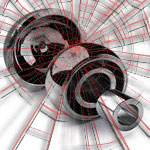Arguments to Be Presented to the JPML to Consolidate Biomet Lawsuits with Other Hip Litigations
 Arguments will soon be presented before the U.S. Judicial Panel on multidistrict litigation (JPML) on whether to consolidate all federal Biomet M2A Magnum hip lawsuits into one court. A notice released on August 8, 2012 states that the JPML has scheduled a hearing on September 20, 2012, to hear oral arguments for and against centralization of federal Biomet lawsuits.
Arguments will soon be presented before the U.S. Judicial Panel on multidistrict litigation (JPML) on whether to consolidate all federal Biomet M2A Magnum hip lawsuits into one court. A notice released on August 8, 2012 states that the JPML has scheduled a hearing on September 20, 2012, to hear oral arguments for and against centralization of federal Biomet lawsuits.
Complications associated with metal-on-metal (MoM) hip implants such as immobility, pain, and premature loosening of the implant. Metallosis has been reported as well.
Similar facts are presented in claims against hip replacement manufacturers
When reviewing the claims against companies like Biomet, Zimmer, and DePuy, one typically finds similar facts. Like the Zimmer Durom Cup, for example, Biomet M2A Magnum places a metal cup inside a metal ball. Originally, the design was supposed to offer better durability than ceramic and plastic implants, but post-marketing reports indicated that a larger-than-expected number of patients were experiencing premature complications.
Patients who have sought the advice of an Zimmer hip attorney, for example, typically claim to have experienced problems with Zimmer hip replacements related to metal contamination. The metal components can shed tiny particles of cobalt and chromium into the surrounding tissues, causing inflammation and tissue damage leading to loosening. Patients complain of pain and instability, and the need to undergo Zimmer hip revision surgery.
In their lawsuits, plaintiffs seek compensation for problems with Zimmer hip and resulting economic losses.
Plaintiffs seek compensation for complications and revision surgeries
Similarly, the Biomet M2A Magnum was linked with reports of metal poisoning, which could cause joint and tissue damage and systemic illness. In 2011, the Australian National Joint Registry reported that patients implanted with the M2A had a yearly revision rate of 7.2 percent—much higher than typical metal-on-polyethylene devices.
In August 2011, the JPML consolidated all Zimmer Durom Cup federal cases of against Zimmer hip into the Northern District of Illinois. Each plaintiff seeks compensation for complications and revision surgeries. Since then, the court has been busy with pre-trial processes, including discovery and scheduling.
Zimmer recently filed a motion to dismiss the master complaint at use in the MDL, stating that it was too general to meet federal pleading standards.
Biomet files a response to the JPML opposing centralization of cases
Biomet filed a response with the JPML on July 19, 2012, opposing centralization. The company stated the cases are too different from one another to benefit from shared pre-trial processes. The components come in different sized and designs, with some products used with femoral stem components that are manufactured by other companies. Biomet also asserted that they have a track record of resolving Magnum actions “expeditiously” and often out of court, negating the need for consolidation.
If the JPML agrees to consolidate these cases, manufacturer Biomet will join other manufacturers like Zimmer, Inc. and DePuy Orthopaedics in defending against a potentially large number of claims that their product was not adequately studied for safety.
[SmartLink zimmerhiplawsuit]

